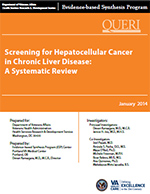
Principal Investigators:
Devan Kansagara, M.D., M.C.R.
Janice H. Jou, M.D., M.H.S.
Co-Investigators
Joel Papak, M.D.
Amirala S. Pasha, D.O., M.S.
Maya O'Neil, Ph.D.
Michele Freeman, M.P.H.
Rose Relevo, MLIS, M.S.
Ana Quinones, Ph.D.
Makalapua Motu'apuaka, B.S.
Download PDF: Complete Report, Executive Summary, Report, Appendices
In the Veterans Health Administration (VHA), there has been a marked increase in the prevalence of cirrhosis from chronic hepatitis C infection with a corresponding increase in the number of hepatocellular cancer (HCC) diagnoses. From 1996 to 2006, the prevalence of cirrhosis among Veterans with chronic hepatitis C infection rose from 9 to 18.5%, and the prevalence of HCC rose from 0.07 to 1.3%. In the general population, the incidence of HCC rose between 1992 and 2005 from 3.1/100,000 to 5.1/100,000, with localized tumors accounting for most of the increase. While, on average, the 5-year survival of HCC is low (13 to 16.5%), the survival of early-stage disease has risen.
The rationale for screening is that imaging tests such as ultrasound can identify patients with early stage HCC and there are several potentially curative treatment options for patients with early stage HCC including liver transplantation, radiofrequency ablation, and liver resection. Several professional society guidelines currently recommend HCC screening using imaging studies and tumor markers mainly in patients with chronic hepatitis B or liver cirrhosis. However, recommendations for HCC screening remain controversial in part because of concerns over the quality and paucity of existing evidence, and because there have been concerns raised about overdiagnosis and patient harms in other cancer screening programs.
We conducted a systematic review of the published literature to better understand the incremental benefits and harms of routine HCC screening in patients with chronic liver disease compared to clinical or incidental diagnosis. We looked for direct evidence of the health outcome effects of screening. We also looked for indirect evidence of the effects of screening by evaluating studies examining the health outcome benefits and harms of treating early-stage HCC which, because the intent and result of routine screening is detection of early-stage disease, is a proxy for screendetected disease.